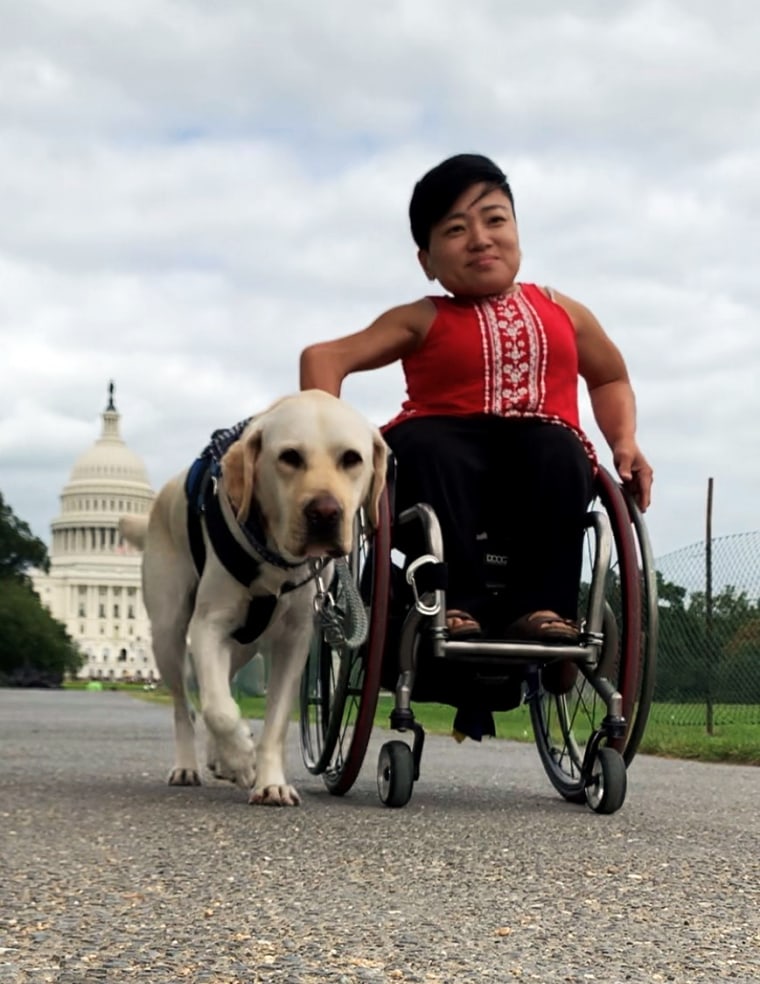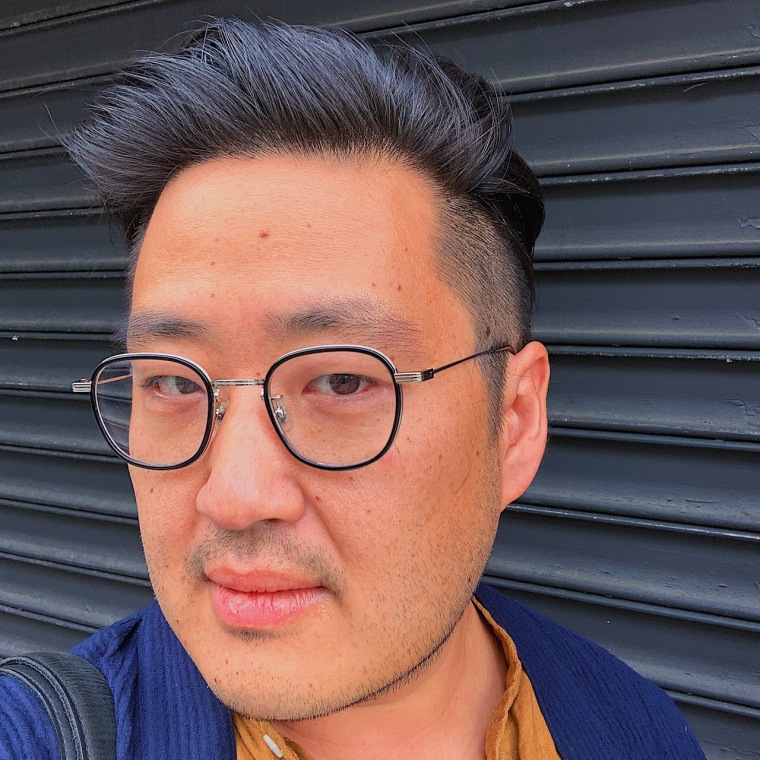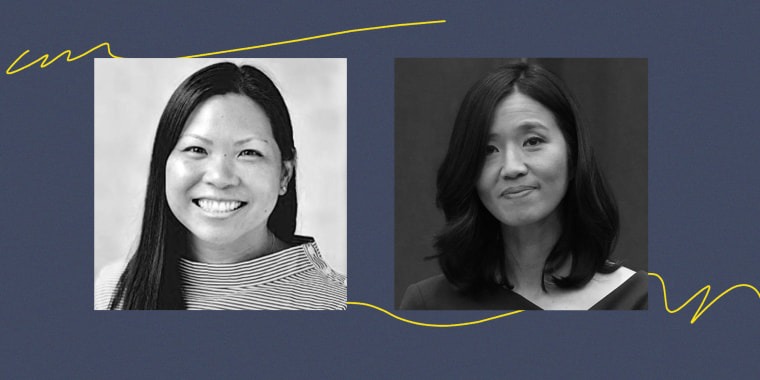When a protester heckled Massachusetts voting rights activist Beth Huang last month thinking she was Boston Mayor Michelle Wu, it was already Huang’s third or fourth run-in with someone who had mistaken her for Wu, the city’s first nonwhite mayor.
“People confuse me and lots of other Asian women for Michelle Wu,” said Huang, the executive director of the Massachusetts Voter Table. “They’ve confused a state rep of Vietnamese descent to be Michelle Wu. They’ve confused a state rep of Korean descent to be Michelle Wu. They must think that Michelle Wu is literally all over the place all the time.”
For Huang and other Asian Americans around the country, such incidents tend to crop up quietly in daily life. This one happened to make headlines, she said, because it occurred so publicly at a news conference.
An “ABC World News Tonight” broadcast last month misidentified New York City community organizer Grace Lee as Michelle Go, an Asian American woman who was pushed in front of a subway train in January, in its coverage of a vigil for Christina Yuna Lee, another Asian American woman who was killed in her apartment.
An ABC spokesperson said the network realized the mistake immediately and corrected it before the show aired anywhere else. In a statement to the Asian American Journalists Association, it said the misidentification was an “unfortunate technical error, not one born from insensitivity.”
During its coverage of this year’s Super Bowl, NBC also misidentified the country singer Mickey Guyton as the R&B singer Jhené Aiko during a preshow performance. NBC Sports apologized on Twitter and didn’t respond to requests for further comment. NBCUniversal is the parent company of NBC News, NBC Asian America and NBC Sports.
“Every time that happens, it’s not intentional. Or I assume it’s not intentional,” Huang said of her misidentification experiences. “But it does make me think that, often, we are not perceived to be as valuable as individual leaders.”
Simple errors like those usually occur without malice, experts say. But Asian Americans are familiar with a painful history of exclusion in the U.S. that has repeatedly stripped them of their individuality, and many see a pattern in the ignorance that enables such mistakes to occur so frequently today.
Although Asian communities have populated the country since the 1800s, public hostility pushed them, as well as other non-Asian ethnic groups, to form cultural enclaves like Chinatowns. Legislation throughout the latter half of the 19th century, such as the Page Act and the Chinese Exclusion Act, further stereotyped Chinese people into a single category.
Asian immigrants initially were portrayed as cheap, dispensable labor. As more arrived in the country, caricatures associated with the “Yellow Peril” depicted them as a threat to the West.
The inability to separate Asian people from their races and perceived nationalities then grew starker as the U.S. entered wars against Asian countries. From the incarceration of Japanese Americans without trial during World War II to the lumping together of various Asian ethnicities during the Korean and Vietnam wars, experts said, such conflicts contributed to the homogenization of Asian Americans.
“Americans were able to separate Nazis from Germans, whereas many Americans weren’t able were able to separate Vietnamese communists from the Vietnamese in general,” said Scott Wong, a professor of Asian American history at Williams College. “Or they couldn’t make the distinction between soldiers in Japan and Japanese Americans. You had to almost show an allegiance to Hitler or Mussolini for you to be interned during the Second World War if you’re German or Italian.”
While that phenomenon might sometimes be attributed to the cross-race effect — the tendency for people of all races to more easily recognize faces of their own race — Wong said its prevalence when applied to Asian Americans is rooted in that perpetual foreignization throughout U.S. history.
“Many Americans, for the longest time, did not grow up seeing Asian people,” Wong said. “It’s not an excuse now, because there’s a lot of Asians in the country, but it’s a legacy of exclusion and then segregation.”
People today probably aren’t conscious of that context when they mistake one Asian person for another, Wong said. While there’s “nothing malicious” about such incidents now, he said, they are a product of habitual American negligence in learning to distinguish between different Asian people and groups.
Ever since the civil rights activist Mia Ives-Rublee gained national prominence for her work in disability justice, she began seeing herself tagged on social media as one of several other Asian American women in the field. The same happens to them in return, she said.

Such mistakes occur so frequently that when someone requested her for a speaking engagement, Ives-Rublee wasn’t sure whether they’d reached out to the right person. She said the constant instances of mistaken identity have made her feel almost like a fraud.
“It’s just been a frustrating experience, particularly when we hit a certain milestone and get mistaken for somebody else,” she said. “It just takes some of the joy out of the hard work that we put in. Like, is my work making the impact that I think it is if people can’t even tell the difference between me and other people?”
DongWon Song, a literary agent based in New York City, said they get mistaken for one of a handful of prominent Asian American literary agents at least once during every professional conference they attend, even though they often are of other nationalities and have distinctly different physical traits.

“It just felt very racially charged as a result,” said Song, who uses “they/them” pronouns. “I think people misunderstand the term ‘microaggression’ in a lot of ways, because the ‘micro’ doesn’t apply to the impact.”
Regardless of intent, they said, instances like those can feel just as dehumanizing as more overtly racist aggressions: It becomes clear that the perpetrator is upholding an internal projection of who they are rather than engaging with them as an individual.
“It’s going to sound like a big leap, but all those tiny little moments are what make it possible for someone to push someone on the subway tracks without thinking of them as a person or to attack a lady in the street,” Song said. “Until people realize they are complicit in that exact same system, whether it’s making fun of my name or getting my pronouns wrong or thinking I’m literally another person, all those things are designed to remove my humanity and agency in a way that enables violence.”
Such honest mistakes are part of a longstanding pattern of violence against Asian Americans. When two men murdered Vincent Chin in Michigan in 1982, they were looking to take out their anger against the Japanese car industry. Chin, a Chinese American man, became the target of a hate crime against an ethnic group he didn’t belong to.
Lok Siu, an associate professor at the University of California, Berkeley, who specializes in Asian diaspora studies, said racist characterizations have repeatedly linked Asian Americans through similar stereotypes and that people view and understand Asian Americans only through those lenses when they don’t make efforts to familiarize themselves with other ethnic groups.
“So you have these different moments of mistaken identities for particular targeted groups that were really just mistakes,” Siu said. “But they’re mistakes that they don’t care about, because it’s not about the people they’re attacking. It’s really about expressing their rage against a group or against somebody.”
Just as health officials in the late 1800s falsely linked Chinatowns to the spread of disease by blaming Chinese Americans for smallpox and cholera outbreaks, Chinese Americans in 2020 once again became scapegoats for the Covid-19 pandemic.
And against the background of tense U.S. relations with China, Siu said, recent government targeting of Chinese scientists is another modern-day manifestation of fear born from the inability to recognize the individuality of Asian Americans.
When all members of a diverse race of people are viewed as one, one ethnic group’s being targeted can mean any ethnic group’s being targeted. The violence against Asian Americans, particularly East Asians, as a result of recent anti-China discourse isn’t surprising, Siu said, because it’s a product of the same phenomenon that has plagued those communities for nearly two centuries.
“It’s not a one-off. It’s not anomalous. It’s part of a historical process,” Siu said. “And you see this emerging again in this moment, but you see the same thing.”

